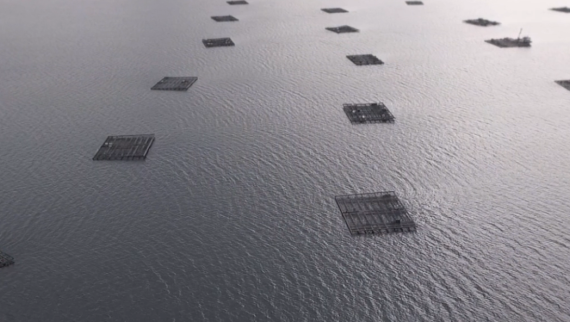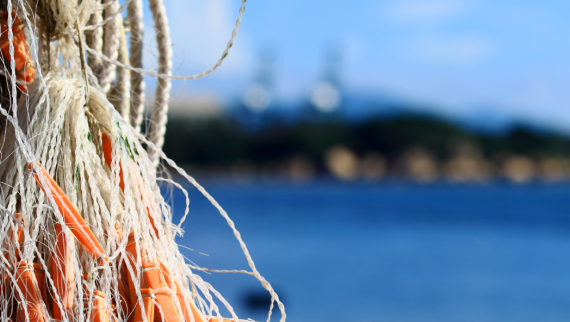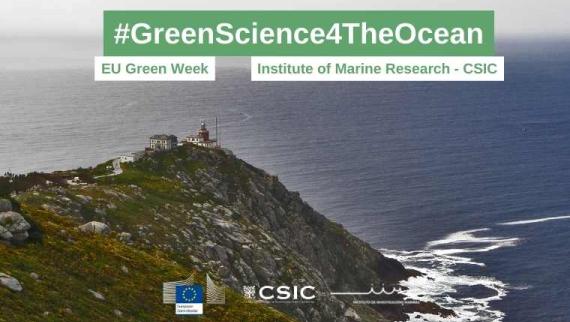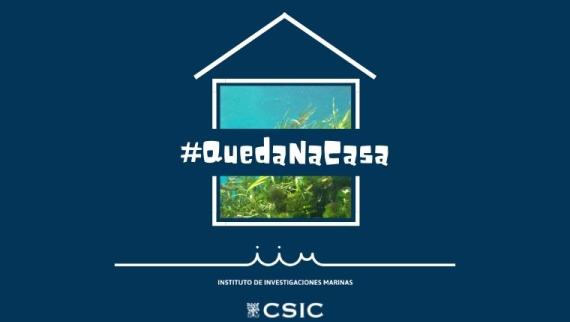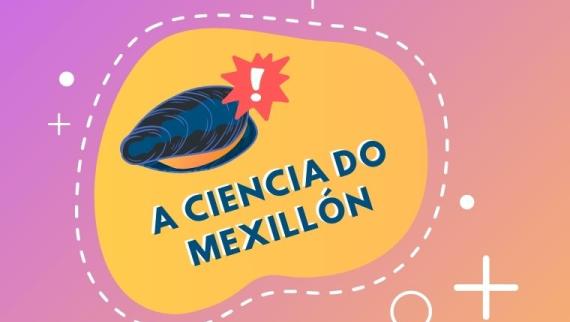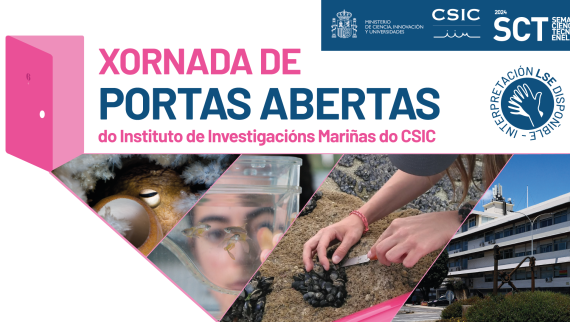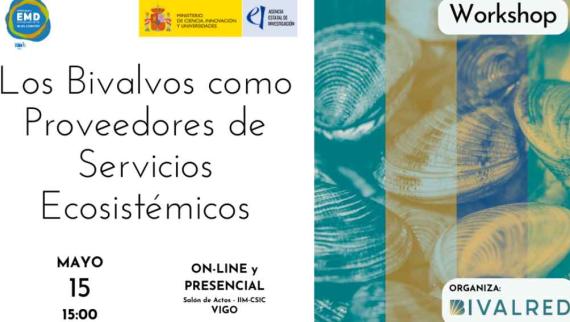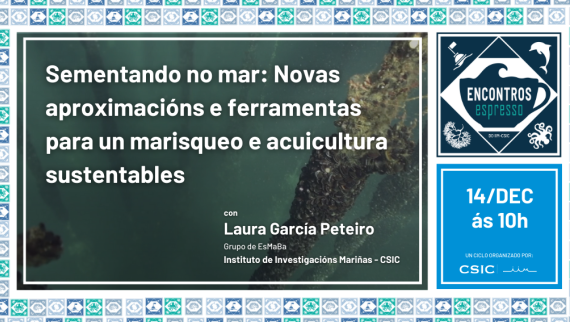Ecophysiology, Biomarkers & Sustainable Management of Bivalves
The Galician blue economy couldn't be understood without bivalves.
From mussels grown on the countless mussel farms found in 'rias' (estuaries) to scallops and clams, bivalves are one of the keystones of the region's aquaculture. Their strategic importance calls for the comprehensive study of ecological interactions of farmed bivalves to assess the effects that climate change could have on their culture and to develop new and more sustainable tools for aquaculture management.
Following this line of work, the IIM-CSIC's Ecophysiology, Biomarkers & Sustainable Management of Bivalves group (also known as 'EsMaBa') researches this strategic field of study, with a particular focus on mussels (Mytilus spp.).
The research team works to understand the ecophysiology of bivalves, that is, how their physiology is affected by environmental conditions, and to develop new methods for the continuous measurement of ecological parameters surrounding farmed animals, such as valvometry. For instance, the group studies the biochemistry of bivalve secretions, such as byssus or shells, and how the environment determines their strength, a key factor, particularly to ensure proper attachment of mussels to culture raft ropes.
Based on these ecophysiological studies, the group is able to determine the impact of climate and global change, bioinvasions or other threats on exploited bivalve species, as well as to model ecosystem carrying capacity, thus generating new aquaculture management tools with an ecosystem perspective.
- MoMeNTo -
Monitorización en tiempo real del cultivo de mejillón en batea: Herramientas para una gestión flexible y resiliente al cambio climático
Principal investigator:Funding body:Este proyecto se desarrolla con la colaboración de la Fundación Biodiversidad, del Ministerio para la Transición Ecológica y el Reto Demográfico, a través del Programa Pleamar, y se cofinancia por la Unión Europea por el FEMPA (Fondo Europeo Marítimo, deFunding for IIM-CSIC:298806€Go to project pageFromto - Oyster-Watch -
<p>Herramientas para la monitorización y control de las vías de expansión de la ostra rizada</p>
Principal investigator:GarcíaPeteiroLauraFunding body:Agencia Estatal de InvestigaciónFunding for IIM-CSIC:190973€Go to project pageFromto - BIVALNET -
<p>Red para el estudio y promoción de los servicios ecosistémicos de bivalvos</p>
Principal investigator:FernándezBabarroJose ManuelFunding body:Ayuda RED2022-134186-T financiada por MICIU/AEI
/10.13039/501100011033. Ministerio de Ciencia, Innovación y Universidades - Agencia Estatal de InvestigaciónFunding for IIM-CSIC:18300€Go to project pageFromto - SOSMOL -
<p>Programa Ciencias Mariñas: Sostibilidade de Moluscos</p>
Principal investigator:FernándezBabarroJose ManuelFunding body:El Programa de Ciencias Mariñas de Galicia es 1 de los 5 programas de Ciencias Marinas de los Planes Complementarios de I+D+I del Plan de Recuperación Transformación y Resilencia. Financiado por FEMP/FEMPA.Funding for IIM-CSIC:136274€Go to project pageFromto <p>Impacto de factores estresantes en los ecosistemas costeros</p>
Principal investigator:CobeloGarcíaAntonioFunding body:Ayudas cofinanciadas con fondos de la Agencia Gallega de Innovación de la Xunta de GaliciaFunding for IIM-CSIC:75000€Go to project pageFromto
- Mangano, M.C.; Berlino, M.; Corbari, L.; Milisenda, G.; Lucchese, M.; Terzo, S.; Bosch-Belmar, M.; Azaza, M.S.; Babarro, J.M.F.; Bakiu, R.; Broitman, B.R.; Buschmann, A.H.; Christofoletti, R.; Dong, Y.; Glamuzina, B.; Luthman, O.; Makridis, P.; Nogueira, A.J.A.; Palomo, M.G.; Dineshram, R.; Sanchez-Jerez, P.; Sevgili, H.; Troell, M.; AbouelFadl, K.Y.; Azra, M.N.; Britz, P.; Carrington, E.; Celi¿, I.; Choi, F.; Qin, C.; Dionísio, M.A.; Dobroslavi¿, T.; Galli, P.; Giannetto, D.; Grabowski, J.H.; Helmuth, B.; Lebata-Ramos, M.J.H.; Lim, P.T.; Liu, Y.; Llorens, S.M.; Mirto, S.; Pe¿arevi¿, M.; Pita, C.; Ragg, N.; Ravagnan, E.; Saidi, D.; Schultz, K.; Shaltout, M.; Tan, S.H. (2022) The aquaculture supply chain in the time of covid-19 pandemic: Vulnerability, resilience, solutions and priorities at the global scale Environmental Science and Policy DOI:10.1016/j.envsci.2021.10.014
- Rodríguez-Velarte, P.; Babarro, J.M.F.; Cobelo-García, A. (2022) Bioaccumulation patterns of trace elements by native (M. galloprovincialis) and invasive (X. securis) mussels in coastal systems (Vigo Ria, NW Iberian Peninsula) Marine Pollution Bulletin DOI:10.1016/j.marpolbul.2022.113463
- Sánchez-Jerez, P.; Babarro, J.M.F.; Padin, X.A.; Longa Portabales, A.; Martinez-Llorens, S.; Ballester-Berman, J.D.; Sara, G.; Magano, M.C. (2022) Cumulative climatic stressors strangles marine aquaculture: Ancillary effects of COVID 19 on Spanish mariculture Aquaculture DOI:10.1016/j.aquaculture.2021.737749
- G. Sar aa; M. C. Manganob; M. Berlinoa; L. Corbaria; M. Lucchesea; G. Milisendab; S. Terzoa; M. S. Azazac; J. M. F. Babarro; R. Bakiue; B. R. Broitmanf; A. H. Buschmanng; R. Christofolettih; A. Deiduni; Y. Dongj; J. Galdiesi; B. Glamuzinak; O. Luthmanl; P. Makridism; A. J. A. Nogueiran; M. G. Palomoo; R. Dineshramp; G. Rilovq; P. Sanchez-Jerezr; H. Sevgilis; M. Troellt; u; K. Y. AbouelFadlv; M. N. Azraw; P. Britzx; C. Brugerey; E. Carringtonz; I. Celi caa; F. Choiab; C. Qinac; T. Dobroslavi ck; P. Galliad; D. Giannettoae; J. Grabowskiab; M. J. H. Lebata-Ramosaf; P. T. Limag; Y. Liuah; S. M. Llorensai; G. Maricchioloaj; S. Mirtoak; M. Pe carevi ck; N. Raggal; E. Ravagnanam; D. Saidian; K. Schultzab; M. Shaltoutao; C. Solidoroaa; S. H. Tanap; V. Thiyagarajanaq; B. Helmuthab (2022) The Synergistic Impacts of Anthropogenic Stressors and COVID-19 on Aquaculture: A Current Global Perspective Reviews in Fisheries Science and Aquaculture DOI:10.1080/23308249.2021.1876633
- Vázquez E; Woodin SA; Wethey DS; Peteiro LG; Olabarria C (2021) Reproduction Under Stress: Acute Effect of Low Salinities and Heat Waves on Reproductive Cycle of Four Ecologically and Commercially Important Bivalves FRONTIERS IN MARINE SCIENCE DOI:10.3389/fmars.2021.685282
- TFM - Hugo Marques Feio (30/08/2021) Effectoftemperatureandsedimentdisturbanceonecophysiologicalresponsesoftheinfaunalclam Polititapes rhomboides Université de Nantes
- PhD - Jihene Lassoued (18/02/2021) Étude des sécrétions coquillère et byssale de la moule Mytilus galloprovincialis: Influence de l¿augmentation de la température et de l¿acidification de l¿eau et possibilités de valorisation Institut National Agronomique de Tunisie
- TFM - Hamza El Morabet (04/03/2016) Shell thickness as protective tissue of the mussel Mytilus galloprovincialis: effect of cultivation site and culture depth Universidade de Vigo (UVIGO)
- TFM - Juan Ramón Suárez García (03/03/2016) Análisis macro- y micro-geográfico de la fortaleza de sujeción del mejillón (Mytilus galloprovincialis) en cultivo UdC
- PhD - Jade Irisarri Cal (15/04/2015) Integration of physiological energetics, biometrics, proximate composition and fatty acids as biomarkers to assess the utilization of fish feed waste by mussels growing near fish cages, UNIVERSIDAD DE VIGO
- Capabilities | Development of management and decision-making tools based on modeling and simulated scenariosCoastal & Environmental Protection Maritime Spatial Planning Ecosystem Services & Governance Aquaculture Fisheries
Development of space-specific tools for assessment, management and decision-making by modeling the impacts of present and possible future environmental scenarios (pollution, climate change, etc.) on oceanographic conditions, biodiversity distribution, physiological response or fisheries and aquaculture performance.
- Capabilities | Development of integrated multi-trophic aquaculture systems
Optimization of multitrophic culture systems in open and closed aquaculture infrastructures, ranging from recirculation fish-macroalgae aquaculture systems, with special focus on the effect of the resultant microbiomes on animal welfare, to the adjustment of low-trophic multi-species aquaculture systems in the ocean.
- Capabilities | Development and optimization of aquaculture systems for traditional and new farmed species
Development of integrated culture techniques for new aquaculture species, as well as optimization of traditional ones based on different approaches (i.e. early development, handling, feeding, disease and immune responses, ecophysiological performance, or ecosystem carrying capacity) to improve animal welfare, yield and sustainability in global marine aquaculture.
- Capabilities | Development of bioindicators for environmental monitoring
Characterization and measurement of micro-physiological responses or molecular markers generated in response to environmental conditions for the development of an early warning system for environmental perturbations.
- Prototype | MUSSEL-HFNI: high-frequency non-invasive (HFNI) low-cost biosensor for aquaculture monitoring
Device to monitor the physiological status of up to 64 bivalves in their culture system in real time.
The monitoring system is based on the analysis of micro-movements of bivalves related to valve opening (valvometry). This technique has been confirmed by recent studies as a very promising technique to detect harmful algal blooms or ocean acidification episodes.
The prototype is being adapted to increase its portability and autonomy. For further information, please contact us by e-mail.




